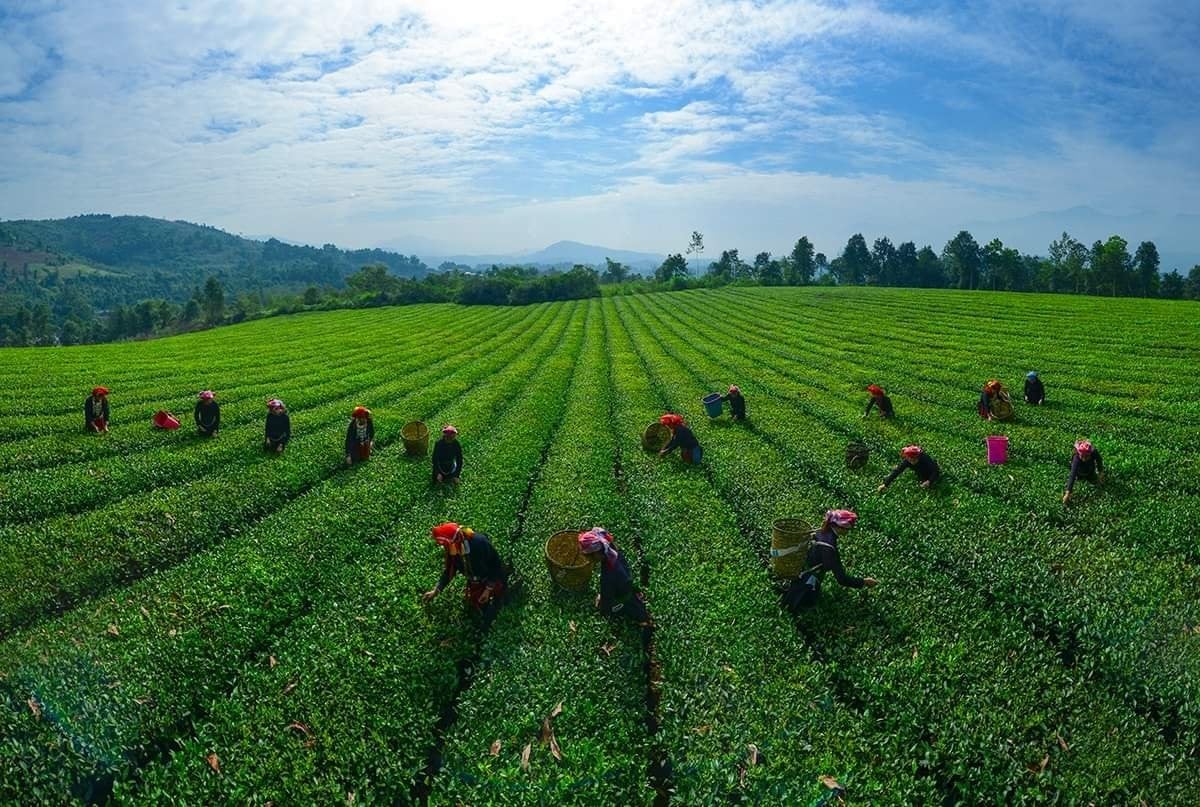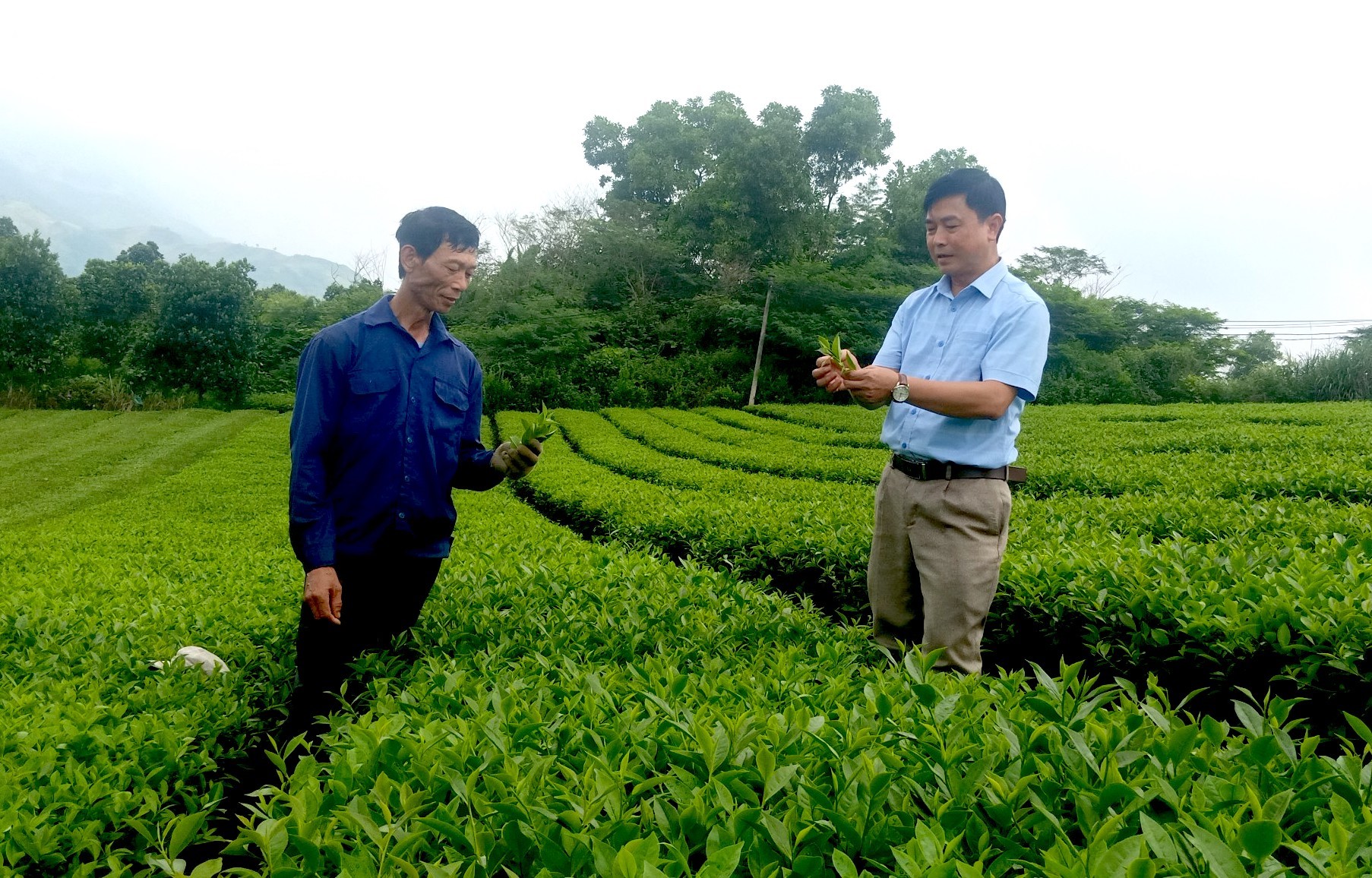November 27, 2025 | 10:18 GMT +7
November 27, 2025 | 10:18 GMT +7
Hotline: 0913.378.918
November 27, 2025 | 10:18 GMT +7
Hotline: 0913.378.918

Tea trees change the face of the countryside and the lives of people in Phu Nhuan (Bao Thang district, Lao Cai). Photo: T.N.
Mr. Do Thanh Long in Phu An 1 village, Phu Nhuan commune (Bao Thang district, Lao Cai), owning more than 3ha of Lai 2 (LDH2) tea, is one of the few households with the largest tea growing area in the village. Three years ago, he contracted the entire tea area of some other households. After that, he boldly applied scientific and technical advances in tea growing, care, and processing.
Up until now, his family's tea products have been of high quality. This year, his family is estimated to harvest about 70 tons of tea. With the selling price of VND 6,000/kg of fresh bud tea, he will earn a revenue of about VND 420 million. After deducting the cost of labor, fertilizer, etc., his family will earn a profit of VND 300 million.
Mr. Tran Quang Chuong, Chairman of Phu Nhuan Commune People's Committee, said that the whole commune currently has 177ha of tea, mainly tea for trading, including Lai 1, Lai 2, and Bat Tien tea varieties cared for according to strict regulations on safe tea production. For many years, tea has become a key crop to help many households in the commune escape poverty, improve their income, and stabilize their lives.
Tea in the commune is estimated to reach a yield of 4-5 tons/ha. Each year, the output of the whole commune reaches about 900 tons of fresh bud tea, worth over VND 5 billion. The tea tree has really played a big role in creating jobs, alleviating poverty, helping to restructure the agricultural economy, forming sustainable raw material areas, etc.
In Phong Hai town (Bao Thang district), Mr. Cu Seo Muoi in Ai Nam village was the first Mong person here to bring back tea trees to grow. His family currently has about 1.3 ha of Bat Tien tea, regularly harvesting about 6 quintals/month. With the current selling price of about VND 10,000/kg, his family earns about VND 6 million/month from selling fresh tea.
Mr. Cu Seo Muoi said that every year, the family has a revenue of about VND 36 million from tea, while the tea tree does not need a large investment and only needs weeding twice and fertilizing every year. Ai Nam village has an altitude of 1,000m, so the tea here is fragrant and delicious, with a higher price than that of other places.
Mr. Do Hong Quan, Head of the Bao Thang Department of Agriculture and Rural Development, said that over the past time, the district has continued to pay attention to implementing the program of intensive farming, developing high-quality tea areas associated with processing, and building the Bao Thang tea brand.

Tea trees bring a more comfortable life to people in the mountainous areas of Bao Thang district (Lao Cai). Photo: T.N.
Along with focusing on improving tea quality, the district will organize the implementation of new planting, replacing old and stunted tea areas with technically advanced varieties with high yield, quality, and efficiency.
Thereby, the district will form concentrated raw material areas in localities, promote production linkages with enterprises and processing facilities in the area, and support processing units in building raw material areas. Through that, both tea growers and production units can stabilize output with guaranteed tea quality.
The specialized agency of Bao Thang district will also focus on guiding tea growers to apply technical advances and invest in intensive farming to increase the yield and output of fresh bud tea. In particular, focus on state management, improving the quality and efficiency of production to meet the standards of food hygiene and safety, and raising income for people.
The whole Bao Thang district now has 509ha of tea, mainly including varieties of Bat Tien, Phuc Van Tien, O Long, etc. The output of fresh bud tea in the first six months of 2023 will reach about 1,800 tons. The consumption market is in the province and Middle Eastern countries. The price of high-quality fresh bud tea applied to the area of Ai Nam village (Phong Hai town) is VND 12,000/kg for type 1, VND 10,000/kg for type 2; and VND 5,500–6,500/kg for tea from other areas.
Translated by Huyen Vu Thu
/2025/11/26/4909-2-154329_878.jpg)
(VAN) Pearl grouper farming in HDPE cages not only delivers economic efficiency but also contributes to protecting the environment, creating jobs, and promoting marine-based experiential tourism.

(VAN) The model of making a living under the forest canopy through the agroforestry system in Van Son commune, Bac Ninh province, is expected to generate an annual income of approximately VND 30 million/ha.

(VAN) Many enterprises in Can Tho are harnessing natural energy and reducing greenhouse gas emissions in their production processes, thereby contributing to the promotion of a sustainable green transition.
/2025/11/24/3536-2-112800_176.jpg)
(VAN) Dong Nai now has tens of thousands of hectares of forests certified for sustainable management, and this area will continue to be expanded in the coming period.

(VAN) Vinh Ha hamlet (Dai Xuyen commune, Hanoi) is shifting away from small-scale farming as households adopt bioscurity into their breeder chicken models.

(VAN) Heavy rains make aquatic species more vulnerable to disease. Proactive water management and high-tech systems help farmers prevent outbreaks and protect yields.

(VAN) Greenhouses are shifting production mindsets in Binh Lu commune, enabling farmers to ‘weather the sun and rain’ and secure stable vegetable harvests throughout the year.